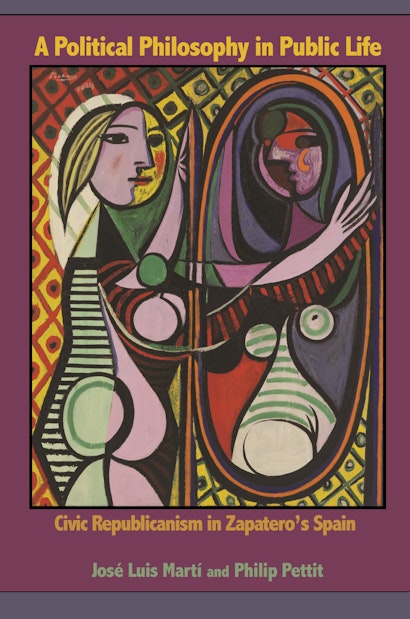This book examines an unlikely development in modern political philosophy: the adoption by a major national government of the ideas of a living political theorist. When José Luis Rodríguez Zapatero became Spain’s opposition leader in 2000, he pledged that if his socialist party won power he would govern Spain in accordance with the principles laid out in Philip Pettit’s 1997 book Republicanism, which presented, as an alternative to liberalism and communitarianism, a theory of freedom and government based on the idea of nondomination. When Zapatero was elected President in 2004, he invited Pettit to Spain to give a major speech about his ideas. Zapatero also invited Pettit to monitor Spanish politics and deliver a kind of report card before the next election. Pettit did so, returning to Spain in 2007 to make a presentation in which he gave Zapatero’s government a qualified thumbs-up for promoting republican ideals.
In this book, Pettit and José Luis Martí provide the historical background to these unusual events, explain the principles of civic republicanism in accessible terms, present Pettit’s report and his response to some of its critics, and include an extensive interview with Zapatero himself. In addition, the authors discuss what is required of a political philosophy if it is to play the sort of public role that civic republicanism has been playing in Spain.
An important account of a rare and remarkable encounter between contemporary political philosophy and real-world politics, this is also a significant work of political philosophy in its own right.
Awards and Recognition
- One of New Statesman's Five Best Political and Economics Books for 2010
Jose Luis Marti is associate professor of law at Pompeu Fabra University in Barcelona. Philip Pettit is the Laurance S. Rockefeller University Professor of Politics and Human Values at Princeton University. His books include Republicanism, A Theory of Freedom, and Made with Words (Princeton).
"This fascinating book dedicates itself to this unique exchange between the worlds of practical governance and political theory."—Choice
"[W]e can thank Marti and Pettit for providing compelling evidence that contemporary political philosophy is as capable of inspiring those who are active in the public square as it is of those gathered around seminar tables."—Richard Dagger, Ethics
"This work is a success at what it intends to do—to recount a compelling event in the history of political theory and practice, to introduce a non-professional audience to republican thought, and to motivate citizens, Spanish or otherwise, to ask what can be done to make our own political practice more just."—Phillip Deen, Philosophy in Review
"The book is lucid, clearly accessible to the general public, well written, and full of insights that are useful both to academic and nonacademic readers. It is a must read for those who are interested in how a political philosophy can enter into dialogue with a real-world experience in politics; Pettit and Marti have been protagonists of a unique experience, and it is a privilege for us readers to have the opportunity to learn about this experience directly from them."—Roberto Gargarella, Perspectives on Politics
"It is rare for the president of a major country to endorse the political philosophy of a living theorist, so Philip Pettit's engagement with Spain's José Luis Rodríguez Zapatero is something of a historical event. Not since the glory days of Russell and Dewey have we seen public political philosophy conducted on this level. This book succeeds wonderfully, both as a document of an important act of public philosophy and as a philosophical work that furthers the development of republican political theory."—Robert B. Talisse, Vanderbilt University
"This is an exercise all too rare in contemporary political philosophy, as Philip Pettit takes up the challenge to apply, develop, and sharpen his ideas about the republican tradition while evaluating the performance of the first government of Spain's José Luis Rodríguez Zapatero. This book does a very good job of drawing direct connections and revealing elective affinities between Pettit's neorepublican political theory and the trajectory of Zapatero's politics both in route to and in government."—Casiano Hacker-Cordón, Centro de Estudios Políticos y Constitucionales, Madrid


